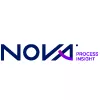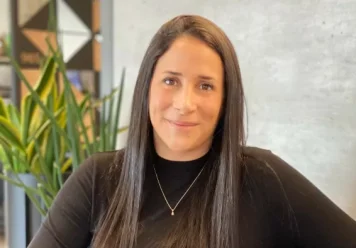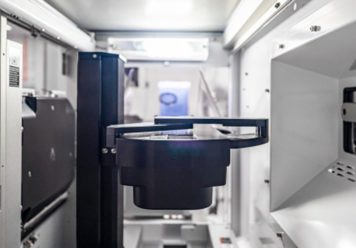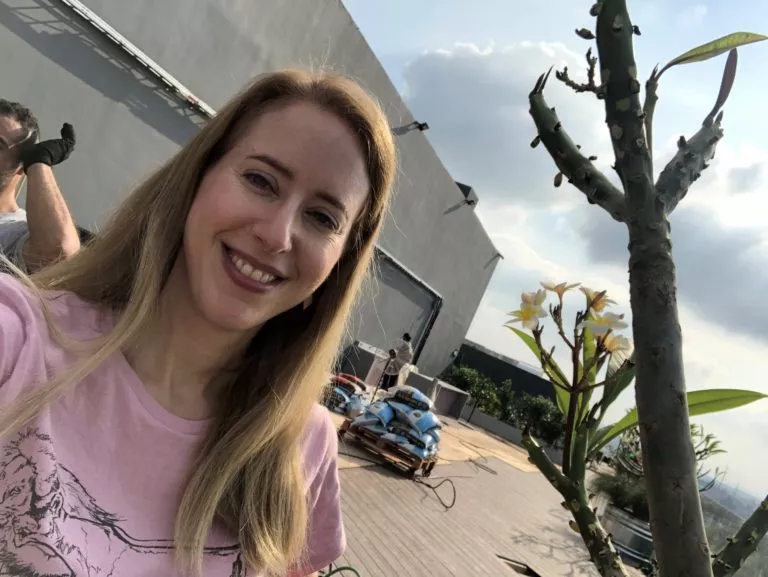Dr. Daphna Peimer- Dancing with Particles of Success
Dr. Daphna Peimer is an algorithm developer at Nova since 2015. Had she not turned to engineering, she would probably have been a dancer. Still, she chose the academic route, leading to a Ph.D., based on extensive research of a new and long-lived elementary particle.
Despite her busy schedule, we managed to catch Dr. Daphna Peimer on a rare break from her daily race to talk about career, academia, success, and some words of wisdom for female students.
First, let’s talk about science! What is your field of study?
In 2001, I graduated with a bachelor’s degree in physics and computer science from Bar-Ilan University. I then went on to pursue a master’s degree in theoretical astrophysics at the Hebrew University, which I completed in 2005, and in 2015 I completed my doctorate at Tel Aviv University in the field of particle physics.
My Ph.D. focused on searching for a new long-lived elementary particle. Based on particle accelerator data from Stanford University, I was looking for proof of the existence of a particle that could make up the dark matter in the universe. The specific “signature” I was looking for is that of a particle that breaks down into material from the standard model after a relatively long time.
Out of left field- Who is your everyday hero?
During my PhD studies, I worked as a teaching assistant in a physics course for engineers in the Faculty of Engineering at Tel Aviv University. While I was solving an exercise on the whiteboard, a lizard suddenly fell from the air conditioner hatch above me- right next to me on the podium. I froze in place while the lizard ran to the corner. Out of 40 students in the room, there was only one female student, and she sat in the front row. She noticed my distress and asked if the lizard was interfering with my ability to continue the lesson. I replied in the affirmative, and in response, she got up, picked the lizard up with her bare hands, and released it outside the window. I’m still in shock- and she’s my hero!
Please introduce us to a day in the life of Nova
I arrive at the office around 8 a.m., look at the meeting schedule and plan my daily tasks accordingly. I work on designing, developing, and researching algorithms to help Nova customers accurately and efficiently measure the latest developments. In between, there are meetings with team members, with the algorithm group, Application engineers, software developers, etc. Twice a week I start the day with a Pilates or yoga class at Nova. Over the past year, we had those lessons online, plus cool mid-day Yoga breaks, which I love. There are often surprises and tasty treats waiting for us in the kitchen or on our desks, and of course, one of the challenging daily tasks is to choose what to order for lunch.
Tell us about a significant contribution you made to product development
When I joined Nova, a member of my team started developing a unique algorithm. Coincidentally, I had the technical tools to develop a model that made the algorithm accessible to any application engineer group. This accessibility has helped refine the algorithm and make it efficient and central to many Nova customers.
Do you feel that we have broken the glass ceiling or that there is still room for improvement?
When there is an adequate representation of all gender and ethnic groups in science, politics, economics, and all centers of power, and when the wage gaps between them are reduced, we will say that we have reached the goal. I am happy to live in a time when awareness of equality is growing, and the world is moving in a positive direction, but there is more to strive for.
Do you have any tips for young female students or those considering a career in engineering?
I taught at the Faculty of Engineering for 4 years. Throughout the period, I was delighted to see a large representation of female students in the faculty, all of them smart, dedicated, and full of promise. It is vital that students are aware of their abilities and the perseverance and ambition they demonstrate and be proud of their achievements.
I once read a study about how men dare to ask more questions than women during classes and that academic instructors tend to answer men first and prioritize men over women when granting speaking permission. I tested this out for myself, and to my surprise, I discovered that this is true for me. Since then, I have made a conscious effort to correct myself and permit female students to speak. Female students can also check if this dynamic is the same in their classes and try to consciously increase the frequency of their questions, making themselves heard to move ahead and understand the material even more.
After many years in academia and the industry – what is the importance of connecting the two worlds?
In industry, as in academia, there is an advantage to creativity and innovation. Sometimes we look for the next original idea, even when it seems like everything has already been tried and tested. That’s why at Nova, we like to bring in lectures by members of the academia – you never know what will ignite the inspiration for the next idea and collaboration.
The process of finding my first job towards the end of my studies was quite long and frustrating. Despite the directions and tools given to us in the workshop towards the end of my Ph.D. studies, I had no concrete proposals or connections in the industry world. Recruitment events and guest lectures at the university from companies like Nova can significantly help students transition from advanced degrees to industry and exposure to jobs where they can leverage the knowledge and tools they have acquired in their studies. It’s important to note that Nova has research teams in various fields such as Physics, Optics, algorithms, and other academic areas. Our work here is highly multi-disciplinary, and we value knowledge from a wide range of domains.
Give me 3 reasons why someone should join the Nova family?
My first reason would be interesting work in a fascinating and evolving field that affects all of us’ daily lives.
Second, Nova has a pleasant and pampering work environment with high-quality, talented people who cheer you on. The general atmosphere allows for a healthy balance between work, family, volunteering, and sports. As a bonus, one can connect with co-workers in Taiwan, Japan, China, Korea, and the US and learn about the cultures, holidays, and mentality of many countries worldwide.
And Third? The sparkling water fountain.
If you were not an engineer, what would you choose to be, and what is the field of research that intrigues you?
If I were not a physicist, I would have been a dancer. It was my dream from a young age, but it didn’t materialize… Many research areas intrigue me, including genetic engineering, psychology, and astrophysics. So, the sky is the limit, and who knows? Maybe a second Ph.D. is in my future!



